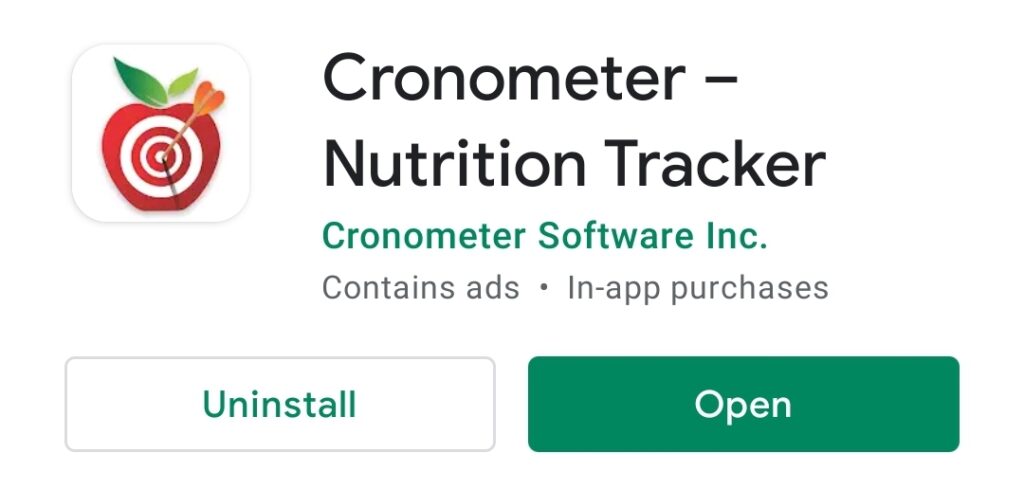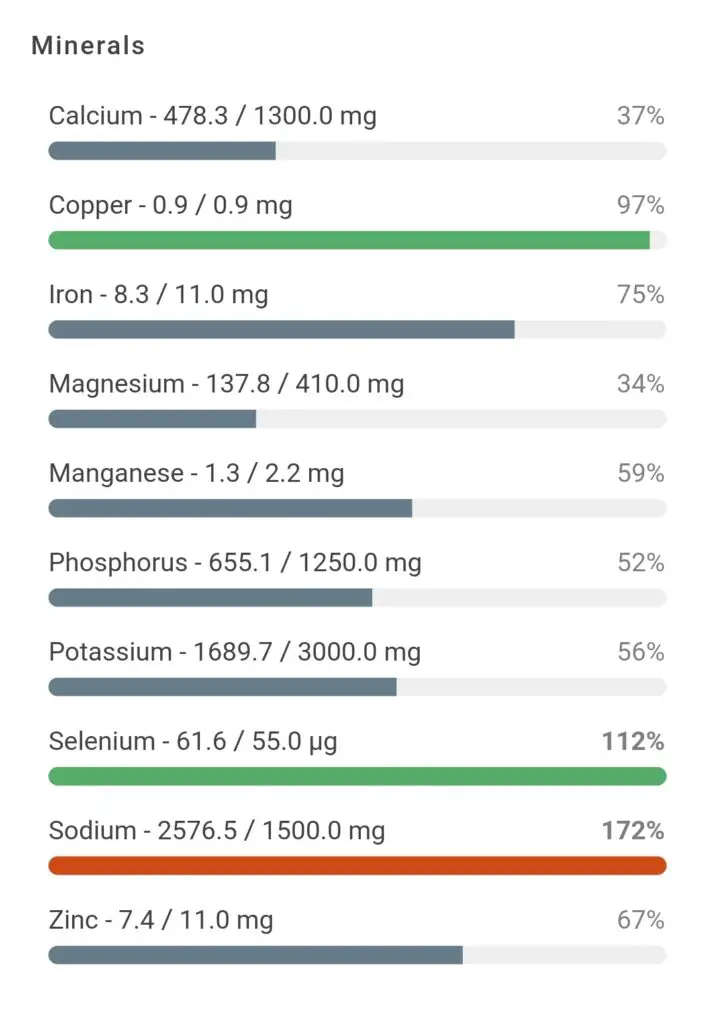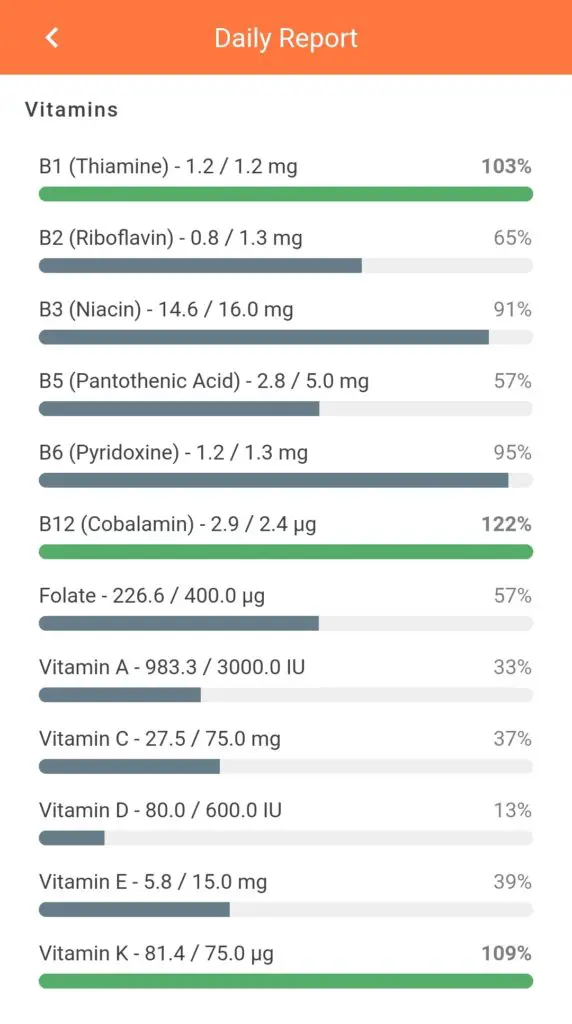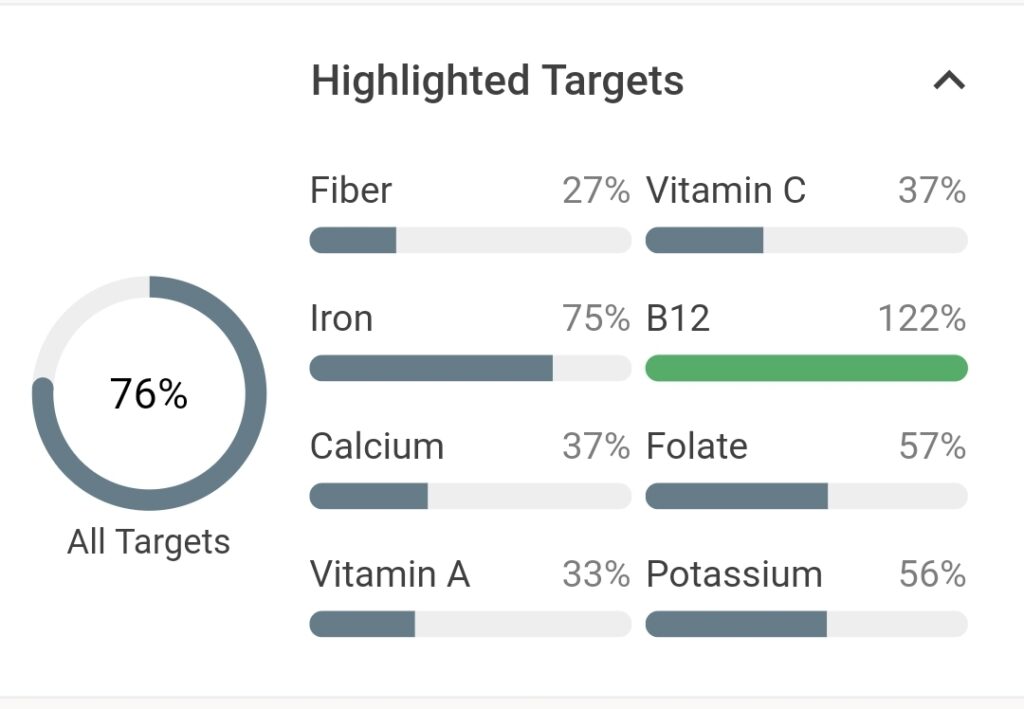The fitness community is always evolving and looking for better ways to lose weight, gain muscle, and keep ourselves healthy. So a new app has emerged, and many people in the fitness community have jumped on it. So here’s the Cronometer review, and who is the app for?
If you don’t have time to read the whole article, here’s what you need to know: The Cronometer App is best for the intermediate-advanced lifter that is very serious about tracking their micronutrients and their health. This app isn’t as beginner-friendly as MyFitnessPal is, but if you’re an advanced lifter that is trying to take the next step for your health and nutrition, Cronometer is for you.
- Read: MyFitnessPal App Review
Let’s get into it, and really discuss this app.

What is Cronometer?
Cronometer is a free calorie/food tracking app.
The app is designed to help you either lose weight or gain weight. But, what makes Cronometer different than the other apps?
Cronometer is different than other apps such as MyFitnessPal because it uses only verified sources for nutrition, but most importantly: it tracks all the micronutrients alongside the macronutrients.
This is something most calorie/food tracking apps won’t do. In fact, MyFitnessPal requires you to pay a premium for it.
Most bodybuilders/fitness addicts don’t realize how important micronutrition actually is.
Your micronutrition includes things like your vitamin and mineral intake.
If you’re missing critical vitamins in your diet, a lot of bad things can happen including reduced muscle growth, bad sleep, bad moods, etcetera.
A big problem is, for most of us that exercise, we end up sweating out a ton of our vitamins/minerals throughout the day and do not replenish them. Furthermore, when we break down muscles, a ton of those vitamins get used and we still don’t replenish them.
This is why it is recommended to take a multivitamin if you lift to help your body keep balance of this.
Cronometer specializes in tracking your micronutrients down to basically the exact number, and that’s what makes this app so powerful for intermediate-advanced lifters looking to take their gains to the next level.
Tommy, How Are Micronutrients Important in Lifting? I’ve only ever heard of ‘macro’ nutrients.
So literally just about every video you watch or article you read about starting lifting is all like, ‘PROTEIN CARBS FATS!!! MACRONUTRIENTS!! THAT’S IT’.
Well, there’s a lot more to it than that.
Sure, that’s the foundation of bodybuilding and lifting. If you don’t have adequate protein your muscles aren’t going to grow, without carbs you’re not going to have the energy (unless you’re on Keto), and without fats, your body just won’t be in a good state.
But, what happens when you have your macronutrients under locks? I mean, after like a month of lifting the whole macronutrient part just kind of comes as common knowledge.
At this mark, many bodybuilders are going super hard in the gym, doing an intense program like Arnold’s Blueprint to Mass, eating 3,000 calories or so a day, but something bad is happening.
Their muscles are sore, they are incredibly fatigued, they are starting to get sick or feel ill- what’s happening?
These Gym Goers Are Suffering From Mineral Deficiencies
I can’t blame you for being skeptical at hearing that. I used to yap at my mom all the time about this.
Mom, there’s no way I’m magnesium deficient, it’s just a cramp from my heavy squatting on Smolov’s program!
But the truth was, I was in fact (yes, my mom was right, who would’ve guessed), suffering from severe magnesium, iron, potassium, and zinc deficiency.
Now for the male lifters out there, if you don’t have zinc, you won’t be gaining muscle as having a zinc deficiency plummets your ability to produce testosterone.
And without magnesium/potassium, your muscles will have a hard time repairing or even working efficiently.
Yep, even an iron deficiency will make you feel incredibly lightheaded and tired all the time as you’ll be anemic.
So, how can we fix this?
Cronometer Fixes This, By Showing You What Minerals/Vitamins Specifically You’re Missing
Cronometer tracks the minerals and vitamins of everything you eat throughout the day. Now I should say, just to be clear, it still tracks your calories + protein/fat/carb intake for the day too.
So you don’t need to use another app for that. Cronometer will give you all of that, just with the added advanced micronutrient tracking.
Whenever you enter a food into Cronometer, it gets added to your diary for the day and it will be added to your daily micronutrient summary. Pretty neat, huh?
Where is Tommy, the fabled bodybuilder of Vekhayn, lacking in micronutrients?
So yeah I’m gonna be honest with you guys, I’m not the best when it comes to diets.
I try my best, but I typically just eat whatever I can. I mean, it works- I have a ton of muscle- but there are some things I can improve. So, let’s take a look at my micronutrient list.

Cronometer review, micronutrients of Tommy from vekhayn. 
Cronometer review, micronutrients of Tommy from vekhayn. (Rip VITAMIN D)
Cronometer makes it super easy to see what micronutrients I’m screwing up on. It’s not complicated numbers or percentages, but color coded. Green? You’re good. Orange, you’re over. Blue, not enough.

Uh, so we have a few problems it looks like.
First of all, my Vitamin D is abysmally low. Most people are actually deficient in Vitamin D, and it’s one of the most important vitamins.
I actually compare it to an anti-depressant. If you’ve read my blog for a while, you’ll know my mental state isn’t necessarily perfect. But that’s okay. I’ve seen some bad things, to say the least.
Vitamin D is one of those supplements I’m prescribed because it’s so good for my mental health. It’s a night and day difference if I’m not taking it.
Thankfully, Cronometer is reminding me that I’m missing something very important in my diet.
But also, that calcium deficiency is going to do nothing but put me at more of a risk for shin splints or a stress fracture.
That magnesium deficiency is going to make me sore and not recover best from my workouts (trust me, I can already feel it).
How Can Cronometer Help Us Fix These Deficienceis And Boost Our Muscle Growth/Fat Loss?
Simply put, in cases of severe mineral or vitamin deficiency your body will be screwed up.
Typically, however, it’s not that extreme. If you have a small deficiency you’ll notice small symptoms.
For instance, muscle cramping is typically magnesium or potassium related. That’s why people always say to eat a banana if you’re cramping because the potassium will fix the cramp.
But if you notice a sudden fatigue in your workout that won’t go away no matter what you try, Cronometer can help you identify what micronutrient you’re missing.
Maybe you can recognize, “Hey, woah woah woah- our Vitamin D levels have been incredibly low. That’s why I feel so garbage suddenly.”- or even “Wow my Zinc has been incredibly low this past month, no wonder I’ve felt weak”.
Now You Can Identify What To Add To Your Diet (Or buy a multi-vitamin)
What most people should do (those that aren’t lazy like me) is look at Cronometer and say, “oh wow, this food gives a lot of Vitamin K, something I’ve been seriously deficient in”.
Then, you can proceed to add foods that give more minerals/vitamins and remove ones that don’t give you good nutrition over time.
For instance, you might go, “well, those eggs are good for me, but those pop tarts are not great for my nutrition, I should make the switch and cut that junk out of my diet”.
Or you can be like me, and just buy one of those ‘One-A-Day Multivitamins‘. Use cronometer to identify what minerals/vitamins you’re usually missing and find a multivitamin that fills that void.
And I think you’ll find yourself seeing better muscle growth, better sleep, having better moods, and just feeling way better in your body.
Is Cronometer Accurate?
This is a very common complaint whenever I put one of my clients on MyFitnessPal:
Tommy, there was no way that whole Bacon King from Burger King was 200 calories. I think MyFitnessPal was wrong…
Yes, it was wrong. Most things are user-submitted, and their search algorithm is the equivalent to literal garbage.
While some things on MyFitnessPal are accurate, most aren’t. This leads to a bad guessing game, or you looking at the label and entering most food yourself. Which to be honest, kind of defeats the purpose of the app.
Luckily, to answer the question: Is Cronometer Accurate, I have good news.
Cronometer is actually, well, almost 99.99% accurate. Everything on Cronometer is very strictly moderated. They don’t let random entries on and the staff verifies what you’re entering. This is FAR better than the MyFitnessPal chaotic million false entries for anything you search.
While there are always some errors no matter what, overall- you should be finding yourself with around a 99% accuracy rate. (At least in my experience of adding over 100 foods over a few days)
This makes it much easier to stay with your goals and track what you’re eating.
Cons of Cronometer
While this app is fairly great, there are some cons.
First of all, it doesn’t have the massive library MyFitnessPal does. While MyFitnessPal has tons of unmoderated entries, it also just has basically every single food product listed on their library.
Even if some are fake, it’s pretty easy to find the ‘real one’ and favorite it for later.
I noticed Cronometer has a way smaller library. While most foods that you’ll ever eat will be on the app, you might run into problems if you shop at places like Costco or Sam’s Club just because some foods there are so rare that they won’t be on the app.
This can take a long time adding in all the micro/macro nutrients for these foods and can make the process tedious.
Additionally, I feel like the MyFitnessPal interface (while it certainly needs improvement) still reigns supreme over Cronometer. As someone who has used tons of different calorie counting apps over the years, Cronometer seems incredibly confusing.
I mean, sure, it’s not too bad. But it’s still really confusing to find your detailed summaries and macronutrients without clicking a whole bunch of buttons.
Cronometer is still new and has a way smaller team than MyFitnessPal does, so I will give them a break there. But if they are reading this, it would be better to make the app a little bit more beginner-friendly.
Other than that, the app works phenomenal.
Conclusion of Cronometer Review
Overall, the app works really well and does a phenomenal job of tracking food incredibly specifically and highlighting nutritional weaknesses in your diet.
If you’re a lifter that’s looking for a jump from MyFitnessPal or you’re looking to take your macros more seriously, I HIGHLY recommend Cronometer. It is free and works really well.
Again, if you’re a beginner, I recommend starting with MyFItnessPal so you don’t get overwhelmed and can use the bigger library to learn the process of food tracking. But once you take those training wheels off, moving onto Cronometer should be your next step!
3 thoughts on “Cronometer Review – Who Is This App For?”